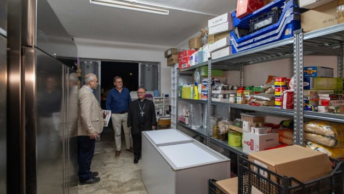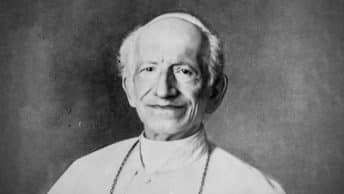I’ve had a constant headache for approximately two weeks now. My mind is churning at full gear in discernment.
The headache started when a deacon friend of mine texted me wanting to know if I had heard about a new diocesan policy asking our churches to raise donations for the latest batch of immigrants bused to Chicago. Like me, my friend does not support illegal immigration. Unlike me, this friend was an immigrant once himself. He did it the “right way” and followed the rules when he arrived. We talked of our dilemma: how do we love and support those I need without being used to promote policies that we ourselves do not support? Our dilemma was not so much religious as it is political. Neither of us is interested in doing the work of Caesar in the name of Christ.
A few days later, I spoke to a Latino priest I know about this dilemma. He smiled at me and said, “Greg, I served in the army before I became a priest. I love this country but, not these policies.” In our conversation we both agreed that we must be charitable to those in need, and fortunately, rather “unfortunately,” there is much need to go around. Our temporary solution is the donation to an area that supports your values. Jesus calls for us to feed the hungry, clothe the naked… regardless of “Caesar and his policies.” At this point, I felt relieved. I must help, but not in a way that enforces illegal activities or political agendas.
My headache dulled, but even I was not naïve enough to believe this was the end.
A week later, I was at a meeting where a discussion of donating to the Chicago Archdiocese’s “Keep Hope Alive” immigration program came up. I knew in a room full of “Blue State” followers that I needed to be cautious with my “Red State” views. In this meeting, we broke out into groups to discuss charitable activities in our ministry regions. Here, I was in a smaller group, so I asked about immigration activities directly. “I need your help,” was my opening. “I am being asked to go into a conservative area where I would expect most of the parishioners are against illegal immigration and told to raise money for these programs and, honestly, I don’t support illegal immigration activities either.” I also pointed out that these people know the Corporal Works of Mercy – they want to respond to people in need. However, they are also not naïve to the background politics these programs may be supporting. “How do you suggest I proceed in this?,” I asked.
What ensued was a great discussion regarding Jesus calling us to “help the helpless” regardless of the situation. Jesus lived in and was crucified by a corrupt system, yet this never influenced his call for mercy, love and charity to others. Furthermore, Jesus worked outside this system. The system never accepted him. It would be ignorant to say the political systems of our society today have improved much in this regard. “Catholic” politicians and Catholic “faithful” alike vote to kill babies.
Like ibuprofen, this conversation dulled my headache but, for only a couple of hours.
My dilemma remained. How do I live Jesus’ call to support the immigrant and help those who are hurting without supporting the policies of Caesar?
It also turns out that my dilemma is not just with one “Catholic” charity. We get lulled into thinking that the word “Catholic” is a safeguard. Yet, many of these charities have policies that I don’t personally support. Worse yet, they support agencies which do not adhere to Catholic teaching. The notion that Catholic Relief Services has used agencies aligned with contraception and abortion has been around for a decade. The Christian Post Reporter’s Ryan Foley as recently as 2021 highlighted that the Catholic Campaign for Human Development funded pro-abortion, pro-LGBT groups as well. This concern has led me to the root of the issue and true danger of “Catholic” charitable activities at the moment.
What is this root and true “danger?” It is not in giving to organizations that are doing the work of Caesar in the name of Christ. The “danger” is letting me get caught up in the politics. The “danger” is letting my heart be hardened by the games that others play and the agendas that blind. My focus must remain in Christ. Christ wasn’t charitable because it forwarded His agenda. His miracles were never given in barter.
This turbidity in thought has clouded my overall sense of using “Catholic” charitable organizations in general. I want to be “faith-based” in my charitable donations. Yet, in a climate where Caesar was allowed to close churches during the COVID-19 pandemic and “faith” is being touted as liability rather than indicative of character… I get confused on where to go and how to act.
Yet, in my discernment, I also realized this dilemma plays out for me routinely and not simply in Church. Many corporations now promote policies which challenge my Catholic values. Corporations are now reimbursing for abortion travel expenses and promoting pro-BLT (in homage to Relevant Radio’s Fr. Simon) policies. How do I justify even working in this business climate?
I justify working in this corporate climate by not being in formal or immediate material cooperation with these activities.
We must recall that:
Formal Cooperation is when we share the intention of the one doing the evil action.
Material Cooperation is when an evil occurs when our actions unintentionally help another person do something wrong.
Immediate Material Cooperation is when we do not approve of the evil action and do not want it to occur, but participate in the action itself.
Mediate Material Cooperation is when we do not approve of the action, do not want it to occur, and only participate indirectly or act in a nonessential aspect of the action.
In our society we are constantly living in cooperation with evil in some regard. As such, we must constantly be on guard to how our intentions exist within this relationship. Just as in the corporate world of my primary vocation, in all my relationships, I must be on guard to only be in mediate material cooperation with evil at best. I must constantly make sure I have an informed conscience regarding the issues that surround me, whether it is in HR policies, my involvement in products that go to market or the charities that I support.
Herein lies the solution – to my headache and dilemma. I must inform my conscience and rightfully act in response to immigration and charitable giving. The important characteristic of Catholic morality is that a good action can never come about from an evil action. Thus, if my informed conscience concludes that any aspect of my cooperation is wrong, the act itself is to be avoided. Helping people in need is good but, if it entails an evil action, we cannot ignore it or justify it away. Funding charities that do awesome work in addition to funding abortion is a cooperation with evil. We must find a better way to do that awesome work. Likewise, if my conscience decides that supporting illegal immigrants supports violating the law, then I should channel my support through a source that does not promote violating the law.
Yet, the issue is still more complicated than that. Some would argue that helping people in need is an intrinsic good. Our faith calls us to action – doing nothing unacceptable too. Disagreement with violating the law is a hurdle we must address; it does not justify doing nothing or walking away. We need to find a better way to deal with the plight of immigration.
My headache has passed…. for now.
I must remember that despite what cable news tells me, Jesus didn’t change the world by winning an election. He won it through self-sacrifice. The Twelve didn’t go to war to defeat secular culture. They invited others to a faith that showed a better Way. They showed up. They acted in faith. I won’t change hearts with words and Christ left politics to Caesar. I must do so as well.
I’ve learned once again that a change in the world starts with an interior change in me. I’ll only make a difference through discernment that leads to a personal, indiscriminating love that I open myself give to others. I can beat Caesar, but only through living authentically the love of Christ.
My conscience knows that people are hurting. I have to do my part to not let Satan win. I’ll write the check and send it to where he’ll hate it the most.








